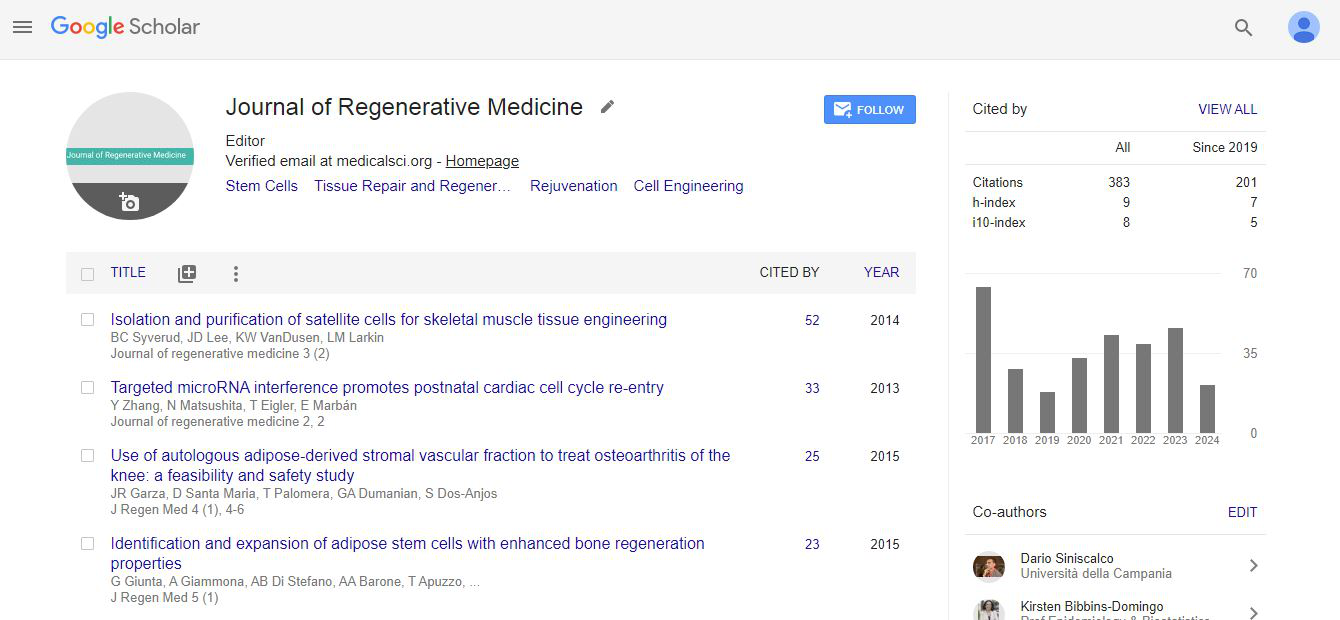The benefits of consuming sweet potato leaves: Helps reduce risk of chronic diseases and promotes health
Milagrosa Chiu Shieh Liu
Comfort Healthy Technology, Taiwan
: J Regen Med
Abstract
Sweet potato (Ipomoea batatas) leaves are loaded with various nutrients, vitamins, dietary fiber, and essential fatty acids. It has great amount of protein, minerals Vitamin B, Beta carotene, Lutein and antioxidants. However, that polyphenols are important antioxidants in sweet potato leaves. The Consumption of polyphenols is associated with reduced risk of chronic diseases, possibly via a variety of bio-mechanisms, including antioxidation and antiinflammation. However, sweet potato leaves commonly consumed in Asia possess polyphenols. According recently studies have suggest that polyphenols of sweet potato leaves were bioavailable and could enhance antioxidant defence and decrease oxidative stress in young healthy people. Sweet potato leaves contained in these nutrients which play a role in health promotion by improving immune function, reducing oxidative stress and free radical damage, reducing cardiovascular disease risk, and suppressing cancer cell growth. Age-related macular degeneration (AMD) is a pathological condition with real cure. As standard for macular degeneration therapies are limited, costly, and often associated with undesirable pathological side effects, the role of nutrition in protecting against degenerative diseases is intensively under scientific consideration. Food fortification with lutein extract has been identified as a low budget prescription to prevent the onset and/or progression of AMD. Major sources of lutein are green vegetables and marigold flower. However, available food sources of lutein contain little amount of lutein and consumption of large quantities of food would be required to meet the suggested daily requirement for lutein. Since sweet potato leaves have no economical value and are discarded following sweet potato harvest. The objective of this article was to consider the concentration of lutein in sweet potato leaves as a potential inexpensive source of lutein. In order to help in the fight against AMD. Sweet potato leaves, which contain several nutrients and bioactive compounds, should be consumed as leafy vegetables in an attempt to reduce malnutrition, especially in developing countries. Currently, sweet potato leaves are consumed mostly in the islands of the Pacific Ocean, in African and Asian countries; limited consumption occurs in the United States. In folk remedies, Sweet potato leaves are used to treat irritations of the mouth and throat and can be crushed and used in ointments to help treat skin conditions such as rashes. In Brazil, a hot water decoction of Sweet potato leaves was historically used to help reduce appetite and symptoms of metabolic issues. Chinese herbalist lore says that the leaves can improve the respiratory and renal system function. Like spinach, chard and other greens, sweet potatoes leaves are highly versatile. This comprehensive review assesses research examining the nutritional characteristics and bioactive compounds within sweet potato leaves that contribute to health promotion and chronic disease prevention thus indicating that increased consumption of this vegetable should be advocated. Since reducing the prevalence of chronic diseases is of public health concern, promoting the consumption of sweet potato leaves warrants further and more intensive research investigation.
Biography
Milagrosa Chiu Shieh Liu has completed her Doctor degree in Naturopathy in 2000 from Trinity College of Natural Health, Indiana, USA. She has studied the Doctor degree of TCM from Chang Chung University of Traditional Chinese Medicine China. Presently, she is the Global Affairs Officer of COMFORT Helathy Tecnology Co.,Ltd. She has presented in more than 30 international conferences in Asia and Latin American countries. She has been serving as a Psychologist, Nutritionist and Host & Columnist in the program of alternative integrative medicine of CNR/CRI in China and Central TV in Rep Dominican.
E-mail: dramilagrosa@gmail.com
 Spanish
Spanish  Chinese
Chinese  Russian
Russian  German
German  French
French  Japanese
Japanese  Portuguese
Portuguese  Hindi
Hindi 